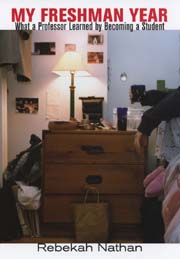Cornell University Press publishes insights by 'undercover professor'

Hesitantly peeling the employee parking sticker off her car and giving up her faculty ID, anthropology professor Rebekah Nathan enrolled as a freshman at her own university to see what life is like for students today.
Bringing her experience in overseas ethnographic fieldwork to the anonymous "AnyU," Nathan immersed herself in student life, moving into the dorms, taking on a full course load, eating in the cafeteria and joining clubs. The resulting book, "My Freshman Year: What a Professor Learned by Becoming a Student," has just been released by Cornell University Press.
The concept for "My Freshman Year" was inspired by Nathan's sense of detachment from her students. She struggled to understand their behavior and attitudes and often wondered why they rarely did the assigned readings or why they brought whole meals to eat during class. She questioned, "Why are students today so different and so hard to teach? Are they, in fact, more likely to cheat, ruder and less motivated?"
Based on her interviews and conversations with fellow classmates, her interactions with professors and with other university employees and offices, and her careful day-to-day observations, the book is a compelling account of college life from a novel perspective. Offering an antidote to the sex and substance abuse on display in other recent portrayals of college life, such as Tom Wolfe's "I am Charlotte Simmons," Barrett Seaman's "Binge: What Your College Student Won't Tell You" and Alexandra Robbins' "Pledged: The Secret Life of Sororities," Nathan offers a more optimistic account. At the end of her freshman year, she has an affection and respect for today's students: Being a student, she discovers, is hard work and students face new challenges to which academic institutions have not adapted fully.
With prepublication coverage in the Chronicle of Higher Education, Inside Higher Ed, Library Journal, Village Voice, Boston Globe, Christian Science Monitor and Newsweek, the book has generated lots of discussion about residential life, research practices and today's time-deprived students. Although the book was published under the pseudonym Rebekah Nathan -- in an agreement with the author who wished to protect as much as possible the university and the students where she conducted her research -- the New York Sun identified her as cultural anthropologist Cathy Small of Northern Arizona University. A feature story in USA Today, written with the author's cooperation, confirmed her identity.
Heidi Lovette, publicity manager at Cornell University Press, said: "When I first learned of the book, I knew the concept was great, but what I hadn't anticipated was how much interest there would be in the undercover aspect and the pseudonym. For us, the real story is not the author's real name, but rather her findings from a unique perspective -- findings that are not specific to her own university but that have important insight into student life at American colleges and universities in the 21st century.
"The media interest has been phenomenal ever since we announced the book at the BookExpo America conference this spring."
The book has sparked much debate in anthropological circles about the ethics of participant-observer research and informed consent. "The discussion is an important one to have," Lovette said, "and I believe that when people have the opportunity to read the book, they will find that it is not at all an exposé of individual students' lives, but rather a thoughtful and nuanced view of the achievements and difficulties confronting America's colleges and universities -- and the students who navigate their lives within them."
Media Contact
Get Cornell news delivered right to your inbox.
Subscribe